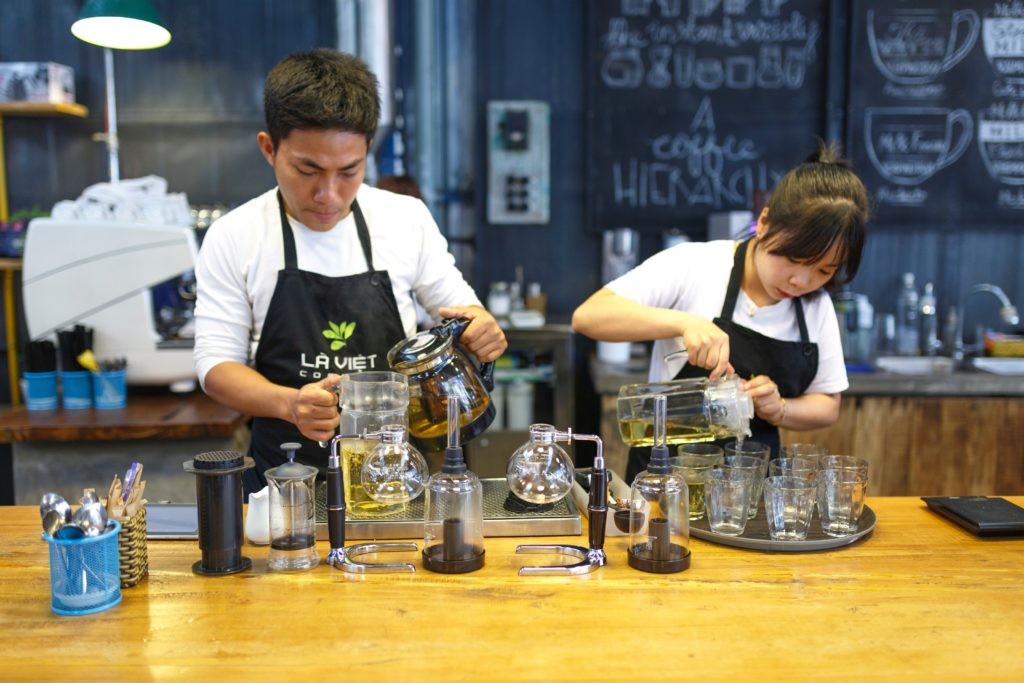Tourism is a powerhouse, significantly impacting global economies and employment rates. At SIXT.VN, we understand the profound connection between travel and job creation, particularly in vibrant destinations like Vietnam. Tourism not only generates a wide array of employment opportunities but also acts as a catalyst for economic growth, contributing significantly to the livelihoods of local communities. It’s a cycle of growth where tourism drives job creation, and these jobs, in turn, enhance the overall tourism experience, fostering greater economic prosperity. Let’s explore how tourism acts as an engine for job creation and drives local economic growth, particularly in destinations like Vietnam.
1. What is the Role of Tourism in Job Creation?
Tourism plays a crucial role in job creation by stimulating demand for a wide range of goods and services, which in turn, leads to increased employment opportunities. According to the World Travel & Tourism Council (WTTC), tourism directly and indirectly supports millions of jobs worldwide, contributing significantly to employment rates. This means that as more people travel, businesses expand, and new jobs are created across various sectors.
Tourism acts as a catalyst for employment across a wide spectrum of industries. Direct tourism jobs, like those in hotels, transportation, and tour operations, are obvious beneficiaries. However, the ripple effect extends far beyond these sectors, creating indirect employment in industries such as agriculture, manufacturing, and retail, which supply goods and services to support the tourism industry. This multiplier effect demonstrates the far-reaching impact of tourism on job creation and economic development. According to a report by the United Nations World Tourism Organization (UNWTO), every dollar spent on tourism generates more than a dollar in economic output. This means that tourism has the power to create jobs and stimulate economic growth in communities around the world.
2. What Types of Jobs Does Tourism Create Directly?
Tourism creates a wide variety of direct jobs, ranging from entry-level positions to highly skilled professional roles. These jobs can be found in different sectors of the tourism industry, including accommodation, transportation, food and beverage, entertainment, and travel services.
2.1. Accommodation
From bustling city hotels to cozy countryside guesthouses, the accommodation sector is a major employer. It requires a diverse workforce, including:
- Front Desk Staff: Welcoming guests, handling reservations, and providing information.
- Housekeeping: Maintaining cleanliness and order in guest rooms and public areas.
- Management: Overseeing operations, ensuring guest satisfaction, and managing finances.
- Maintenance: Keeping the property in good repair.
2.2. Transportation
Getting tourists from one place to another creates numerous jobs, such as:
- Drivers: Providing transportation services via taxis, buses, and private cars. SIXT.VN offers reliable airport transfer services, ensuring a smooth start to your Vietnam adventure.
- Pilots and Flight Attendants: Working in the airline industry.
- Tour Guides: Leading excursions and providing insights into local attractions.
2.3. Food and Beverage
Restaurants, cafes, and bars thrive on tourism, employing:
- Chefs: Preparing delicious meals showcasing local cuisine.
- Servers: Providing attentive service to diners.
- Bartenders: Crafting cocktails and serving beverages.
- Kitchen Staff: Supporting culinary operations.
2.4. Entertainment
The entertainment sector relies on tourism for revenue, providing jobs for:
- Performers: Entertaining audiences with music, dance, and theater.
- Event Organizers: Planning and executing festivals and cultural events.
- Museum Staff: Curating exhibits and educating visitors.
2.5. Travel Services
Travel agencies and tour operators are essential for planning and booking trips, employing:
- Travel Agents: Assisting customers with travel arrangements.
- Tour Operators: Creating and managing tour packages.
- Customer Service Representatives: Providing support and assistance to travelers.
By investing in tourism-related infrastructure and services, destinations can unlock new economic opportunities and improve the quality of life for residents. According to data from the Vietnam National Administration of Tourism, the tourism industry contributes significantly to the country’s GDP, generating billions of dollars in revenue and supporting millions of jobs.
 a street food vendor cooking on a barbecue, exemplifying job creation through tourism
a street food vendor cooking on a barbecue, exemplifying job creation through tourism
3. What are Examples of Indirect Job Creation in Tourism?
Beyond direct employment, tourism generates significant indirect job creation across various sectors. These jobs support the tourism industry by providing goods and services necessary for its operation and expansion.
3.1. Agriculture
Farms and food producers supply restaurants and hotels with fresh ingredients, creating jobs for:
- Farmers: Growing crops and raising livestock.
- Agricultural Workers: Planting, harvesting, and processing produce.
- Distributors: Transporting goods from farms to businesses.
3.2. Manufacturing
Manufacturers produce goods used by hotels, restaurants, and souvenir shops, employing:
- Factory Workers: Assembling and producing products.
- Designers: Creating and designing products.
- Sales Representatives: Selling products to businesses.
3.3. Retail
Souvenir shops, boutiques, and local markets thrive on tourism, providing jobs for:
- Sales Associates: Assisting customers and selling merchandise.
- Store Managers: Overseeing operations and managing staff.
- Artisans: Creating and selling handmade crafts and souvenirs.
3.4. Construction
As tourism grows, there’s a need for new hotels, resorts, and infrastructure, creating jobs for:
- Construction Workers: Building new facilities.
- Architects: Designing buildings and infrastructure.
- Engineers: Overseeing construction projects.
3.5. Service Industries
Businesses providing services to tourists and tourism-related businesses, such as:
- Laundry Services: Cleaning linens and uniforms for hotels and restaurants.
- Marketing Agencies: Promoting tourism destinations and businesses.
- Accounting Firms: Providing financial services to tourism-related companies.
SIXT.VN recognizes the importance of these interconnected industries and strives to support local businesses and communities through its operations. By choosing SIXT.VN for your Vietnam travel needs, you’re contributing to the growth and sustainability of these vital sectors.
 a tour boat operator, an example of direct employment in tourism
a tour boat operator, an example of direct employment in tourism
4. How Can Tourism Alleviate Poverty in Developing Countries?
Tourism can be a powerful tool for poverty alleviation in developing countries by providing income-generating opportunities for local communities. The industry has the potential to generate direct income for the poor in the places they live. Many tourism businesses are owned by individuals and their families, which in turn enables deeper interactions between guests and host communities. These small-scale businesses often include guesthouses and restaurants as they often do not require much capital to invest into. Therefore, many communities can start making their living through tourism.
4.1. Income Generation
Tourism provides opportunities for local communities to generate income through various means:
- Small Businesses: Individuals can start small businesses, such as guesthouses, restaurants, and souvenir shops, to cater to tourists.
- Employment: Tourism creates jobs in hotels, restaurants, tour companies, and other tourism-related businesses.
- Handicrafts: Local artisans can sell their crafts and souvenirs to tourists, providing them with a source of income.
4.2. Community Development
Tourism can contribute to community development by funding infrastructure improvements and social programs:
- Infrastructure: Tourism revenue can be used to improve roads, airports, and other infrastructure, benefiting both tourists and local residents.
- Education: Tourism can fund schools and training programs, improving the skills and knowledge of local people.
- Healthcare: Tourism can support healthcare facilities and programs, improving the health and well-being of local communities.
4.3. Cultural Preservation
Tourism can promote cultural preservation by encouraging local communities to maintain their traditions and customs:
- Cultural Tourism: Tourists are often interested in experiencing local culture, which encourages communities to preserve their traditions and customs.
- Festivals and Events: Tourism can support local festivals and events, which showcase local culture and attract tourists.
- Handicrafts: The demand for local handicrafts encourages artisans to continue producing traditional crafts.
SIXT.VN is committed to responsible tourism practices that benefit local communities in Vietnam. By working with local suppliers and promoting sustainable tourism initiatives, SIXT.VN helps to ensure that tourism contributes to poverty alleviation and community development. We offer tours that immerse you in the local culture, such as visits to traditional villages and participation in local festivals.
5. What Skills and Training are Needed for Tourism Jobs?
To succeed in the tourism industry, employees need a combination of technical skills, soft skills, and industry-specific knowledge. These skills and training can help individuals secure jobs and advance their careers in tourism.
5.1. Technical Skills
Technical skills are essential for performing specific tasks in tourism jobs:
- Language Proficiency: Fluency in English and other languages is crucial for communicating with international tourists.
- Computer Skills: Proficiency in computer applications, such as Microsoft Office and reservation systems, is necessary for many tourism jobs.
- Culinary Skills: Chefs and cooks need culinary skills to prepare delicious meals for tourists.
- Driving Skills: Drivers need driving skills to transport tourists safely and efficiently.
5.2. Soft Skills
Soft skills are interpersonal and communication skills that are essential for providing excellent customer service:
- Communication Skills: Excellent communication skills are necessary for interacting with tourists and colleagues.
- Customer Service Skills: A strong customer service orientation is essential for providing a positive experience for tourists.
- Problem-Solving Skills: The ability to solve problems and handle complaints effectively is crucial for ensuring customer satisfaction.
- Teamwork Skills: The ability to work effectively in a team is essential for achieving common goals.
5.3. Industry-Specific Knowledge
Industry-specific knowledge is essential for understanding the tourism industry and providing informed service to tourists:
- Knowledge of Local Attractions: Familiarity with local attractions, history, and culture is essential for providing information and guidance to tourists.
- Knowledge of Tourism Trends: Awareness of current tourism trends and developments is important for adapting to changing customer needs.
- Knowledge of Tourism Regulations: Understanding of tourism regulations and standards is necessary for ensuring compliance and safety.
SIXT.VN invests in training and development programs for its employees to ensure they have the skills and knowledge necessary to provide excellent service to customers. We also partner with local training providers to offer tourism-related courses and workshops to local communities.
 local market with vendors, where retail jobs thrive with tourism
local market with vendors, where retail jobs thrive with tourism
6. What are the Challenges Facing the Tourism Workforce?
The tourism workforce faces several challenges, including staff shortages, seasonality, and the impact of external factors such as pandemics and economic downturns. Addressing these challenges is essential for ensuring the sustainability and resilience of the tourism industry.
6.1. Staff Shortages
Staff shortages are a common challenge in the tourism industry, particularly during peak seasons:
- Low Wages: Low wages and limited benefits can make it difficult to attract and retain qualified staff.
- Seasonal Work: The seasonal nature of many tourism jobs can lead to job insecurity and high turnover rates.
- Lack of Training: Insufficient training and development opportunities can limit career advancement and employee satisfaction.
6.2. Seasonality
Seasonality can create instability in the tourism workforce, leading to fluctuations in employment levels:
- Fluctuating Demand: Demand for tourism services varies depending on the season, which can lead to periods of high employment followed by layoffs.
- Job Insecurity: Seasonal workers may face job insecurity and difficulty finding year-round employment.
- Limited Benefits: Seasonal workers may not be eligible for benefits, such as health insurance and paid time off.
6.3. External Factors
External factors, such as pandemics and economic downturns, can have a significant impact on the tourism workforce:
- Pandemics: Pandemics can lead to travel restrictions and a decline in tourism demand, resulting in job losses and business closures.
- Economic Downturns: Economic downturns can reduce consumer spending on travel and leisure, leading to a decrease in tourism revenue and employment.
- Natural Disasters: Natural disasters can damage tourism infrastructure and disrupt travel patterns, impacting the tourism workforce.
SIXT.VN is committed to addressing these challenges by providing fair wages, offering year-round employment opportunities, and investing in training and development programs for its employees. We also work with local communities to develop sustainable tourism initiatives that promote economic stability and resilience.
7. How Can Technology Transform Job Opportunities in Tourism?
Technology is transforming job opportunities in tourism by creating new roles, enhancing efficiency, and improving the customer experience. Embracing technology is essential for staying competitive and attracting a skilled workforce.
7.1. New Job Roles
Technology is creating new job roles in tourism, such as:
- Digital Marketing Specialists: Promoting tourism destinations and businesses online.
- Social Media Managers: Engaging with customers and managing online presence.
- Data Analysts: Analyzing data to improve tourism operations and customer experience.
- Web Developers: Creating and maintaining tourism websites and applications.
7.2. Enhanced Efficiency
Technology is enhancing efficiency in tourism operations by automating tasks and streamlining processes:
- Online Booking Systems: Automating reservations and ticketing.
- Customer Relationship Management (CRM) Systems: Managing customer interactions and preferences.
- Mobile Applications: Providing information and services to tourists on the go.
- Artificial Intelligence (AI): Using AI to improve customer service and personalize travel experiences.
7.3. Improved Customer Experience
Technology is improving the customer experience by providing personalized service, seamless communication, and convenient access to information:
- Personalized Recommendations: Providing personalized recommendations based on customer preferences and behavior.
- Chatbots: Providing instant customer support and assistance.
- Virtual Tours: Allowing customers to explore tourism destinations virtually.
- Mobile Check-In: Enabling customers to check in to hotels and flights using their mobile devices.
SIXT.VN embraces technology to improve its services and create new job opportunities in Vietnam. We offer online booking services, mobile applications, and personalized recommendations to enhance the customer experience. We also invest in training and development programs to ensure our employees have the skills and knowledge necessary to use technology effectively.
 airport terminal interior, reflecting tourism's need for efficient transportation
airport terminal interior, reflecting tourism's need for efficient transportation
8. What Role Does Sustainable Tourism Play in Long-Term Job Creation?
Sustainable tourism plays a crucial role in long-term job creation by preserving natural and cultural resources, supporting local communities, and promoting responsible tourism practices. Sustainable tourism ensures that tourism benefits both tourists and local communities while minimizing negative impacts on the environment and culture.
8.1. Resource Preservation
Sustainable tourism practices help preserve natural and cultural resources, which are essential for attracting tourists and creating long-term job opportunities:
- Environmental Protection: Protecting natural resources, such as forests, beaches, and wildlife, ensures that tourism destinations remain attractive to visitors.
- Cultural Preservation: Preserving cultural heritage, such as historic sites, traditional crafts, and local customs, provides tourists with unique and authentic experiences.
- Community Involvement: Involving local communities in tourism planning and development ensures that tourism benefits local residents and preserves their way of life.
8.2. Economic Benefits
Sustainable tourism can generate economic benefits for local communities by creating jobs, supporting local businesses, and diversifying the economy:
- Job Creation: Sustainable tourism practices can create jobs in eco-tourism, cultural tourism, and community-based tourism.
- Local Businesses: Sustainable tourism encourages tourists to support local businesses, such as restaurants, guesthouses, and souvenir shops.
- Economic Diversification: Sustainable tourism can diversify the economy by promoting new industries, such as eco-tourism and cultural tourism.
8.3. Responsible Tourism Practices
Sustainable tourism promotes responsible tourism practices that minimize negative impacts on the environment and culture:
- Reducing Waste: Reducing waste and conserving resources, such as water and energy, helps minimize the environmental impact of tourism.
- Respecting Local Culture: Respecting local culture and customs ensures that tourism does not disrupt local communities or undermine their way of life.
- Supporting Local Communities: Supporting local communities by purchasing local products and services ensures that tourism benefits local residents.
SIXT.VN is committed to sustainable tourism practices that promote long-term job creation and benefit local communities in Vietnam. We support eco-tourism initiatives, promote cultural preservation, and encourage responsible tourism practices among our customers and employees.
9. How Can Governments Support Tourism Job Growth?
Governments can play a vital role in supporting tourism job growth by implementing policies that promote tourism development, invest in infrastructure, and provide training and education opportunities. Government support is essential for creating a favorable environment for tourism businesses to thrive.
9.1. Policy Support
Governments can implement policies that promote tourism development, such as:
- Tax Incentives: Providing tax incentives to tourism businesses to encourage investment and job creation.
- Streamlined Regulations: Simplifying regulations and reducing bureaucratic hurdles to make it easier for tourism businesses to operate.
- Marketing and Promotion: Promoting tourism destinations and businesses through marketing and advertising campaigns.
9.2. Infrastructure Investment
Governments can invest in infrastructure to support tourism development, such as:
- Transportation: Improving transportation infrastructure, such as roads, airports, and railways, to make it easier for tourists to access tourism destinations.
- Accommodation: Investing in accommodation facilities, such as hotels and resorts, to provide tourists with a range of lodging options.
- Tourism Facilities: Developing tourism facilities, such as museums, parks, and cultural centers, to enhance the tourism experience.
9.3. Training and Education
Governments can provide training and education opportunities to support tourism job growth, such as:
- Tourism Schools: Establishing tourism schools and vocational training programs to provide individuals with the skills and knowledge necessary to succeed in the tourism industry.
- Scholarships and Grants: Providing scholarships and grants to students pursuing tourism-related studies.
- Training Programs: Offering training programs for tourism workers to improve their skills and knowledge.
The Vietnam government has implemented various policies to support tourism job growth, including tax incentives for tourism businesses, infrastructure investment, and training programs for tourism workers. SIXT.VN supports these initiatives and works with the government to promote sustainable tourism development in Vietnam.
10. What are the Future Trends in Tourism Job Creation?
The future of tourism job creation is shaped by several trends, including the growth of sustainable tourism, the increasing use of technology, and the rise of experiential travel. Adapting to these trends is essential for creating new job opportunities and ensuring the long-term sustainability of the tourism industry.
10.1. Sustainable Tourism
The demand for sustainable tourism is growing, creating new job opportunities in eco-tourism, cultural tourism, and community-based tourism:
- Eco-Tourism Guides: Leading eco-tours and educating tourists about environmental conservation.
- Cultural Tourism Specialists: Developing and managing cultural tourism experiences.
- Community-Based Tourism Coordinators: Working with local communities to develop and promote community-based tourism initiatives.
10.2. Technology Integration
The increasing use of technology is creating new job roles in digital marketing, data analysis, and customer service:
- Digital Marketing Specialists: Promoting tourism destinations and businesses online.
- Data Analysts: Analyzing data to improve tourism operations and customer experience.
- Customer Service Representatives: Providing customer support through online channels and chatbots.
10.3. Experiential Travel
The rise of experiential travel is creating new job opportunities in tour operations, event planning, and culinary tourism:
- Tour Operators: Creating and managing unique and authentic tour experiences.
- Event Planners: Organizing festivals, cultural events, and culinary experiences.
- Culinary Tourism Specialists: Developing and promoting culinary tourism experiences.
SIXT.VN is committed to adapting to these future trends by promoting sustainable tourism practices, embracing technology, and creating unique and authentic travel experiences for our customers in Vietnam.
Ready to explore Vietnam and contribute to the growth of its tourism industry? Contact SIXT.VN today to book your airport transfer, hotel, or tour.
Address: 260 Cau Giay, Hanoi, Vietnam
Hotline/Whatsapp: +84 986 244 358
Website: SIXT.VN
 an artisan creating souvenirs in Hanoi, symbolizing job creation through cultural tourism
an artisan creating souvenirs in Hanoi, symbolizing job creation through cultural tourism
Frequently Asked Questions (FAQs)
1. How does tourism contribute to local economies?
Tourism stimulates local economies by generating revenue for businesses, creating jobs, and funding infrastructure improvements. According to the Vietnam National Administration of Tourism, the tourism industry contributes significantly to the country’s GDP.
2. What are the main types of jobs created by tourism?
Tourism creates a wide variety of jobs in accommodation, transportation, food and beverage, entertainment, and travel services.
3. How can tourism help alleviate poverty?
Tourism provides income-generating opportunities for local communities through small businesses, employment, and the sale of handicrafts.
4. What skills are needed for tourism jobs?
Tourism jobs require a combination of technical skills, soft skills, and industry-specific knowledge, such as language proficiency, customer service skills, and knowledge of local attractions.
5. What are the challenges facing the tourism workforce?
The tourism workforce faces challenges such as staff shortages, seasonality, and the impact of external factors such as pandemics and economic downturns.
6. How can technology transform job opportunities in tourism?
Technology is creating new job roles, enhancing efficiency, and improving the customer experience in the tourism industry.
7. What role does sustainable tourism play in long-term job creation?
Sustainable tourism preserves natural and cultural resources, supports local communities, and promotes responsible tourism practices, ensuring long-term job creation.
8. How can governments support tourism job growth?
Governments can support tourism job growth by implementing policies that promote tourism development, invest in infrastructure, and provide training and education opportunities.
9. What are the future trends in tourism job creation?
Future trends include the growth of sustainable tourism, the increasing use of technology, and the rise of experiential travel.
10. How can I find tourism jobs in Vietnam?
You can find tourism jobs in Vietnam through online job boards, tourism agencies, and by contacting tourism businesses directly, such as SIXT.VN.



